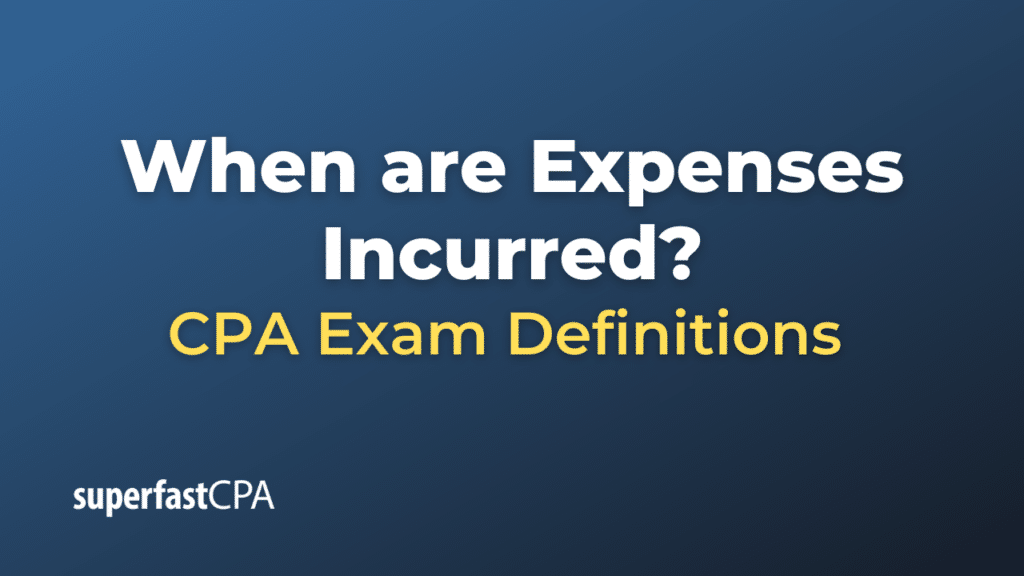When are Expenses Incurred
In accounting, expenses are considered to be “incurred” when the company receives goods, services, or benefits, or is legally obligated to pay for them, even if payment has not yet been made. The timing of when an expense is incurred depends on the accounting method used by the business—specifically, cash accounting or accrual accounting.
Cash Accounting
In cash accounting, expenses are recognized (recorded) only when payment is made. In this case, an expense is incurred when you actually pay for a good or service. For example, if you pay $200 for office supplies, the expense is considered incurred at the moment you make the payment.
Accrual Accounting
Under the accrual accounting method, expenses are recognized when they are incurred, not necessarily when they are paid. In other words, if you receive a service or goods, or become legally obligated to pay for them, the expense is incurred, regardless of whether payment has been made.
Examples of When Expenses are Incurred in Accrual Accounting:
- Utilities: The moment you use electricity, water, or other utilities in a business, you incur an expense, even though the bill might arrive and be paid at a later date.
- Rent: If your rental agreement states that rent is due on the first day of each month, the rent expense is incurred on that date, whether or not you make the payment on that day.
- Wages: Employees incur wages for the time they work, even if they are paid at a later date.
- Interest: If you have a loan, interest expense accrues over time according to the terms of the loan agreement, whether or not the interest has been paid.
- Goods Received: If you receive goods from a supplier but have not yet paid for them, the cost of the goods is incurred when they are delivered, not when you pay the bill.
Example of When are Expenses Incurred
Let’s consider a hypothetical example of a small consulting firm, “ConsultCo,” to illustrate when expenses are incurred under accrual accounting.
Scenario 1: Utility Expense
ConsultCo receives electricity services throughout the month of June but receives the bill for these services on July 5th. The bill amounts to $200.
When is the Expense Incurred?
The expense is incurred throughout the month of June as ConsultCo uses electricity, even though the bill arrives in July.
Journal Entries:
- End of June (upon incurring the expense):
Dr: Utility Expense $200
Cr: Accounts Payable $200- July 5 (upon paying the bill):
Dr: Accounts Payable $200
Cr: Cash $200Scenario 2: Employee Wages
ConsultCo has one employee who earns $4,000 per month. The employee works throughout the month but is paid on the 5th of the following month.
When is the Expense Incurred?
The wage expense is incurred throughout the month as the employee works, even though payment is made on the 5th of the following month.
Journal Entries:
- End of the month (upon incurring the expense):
Dr: Wage Expense $4,000
Cr: Wages Payable $4,000- 5th of next month (upon paying the employee):
Dr: Wages Payable $4,000
Cr: Cash $4,000Scenario 3: Office Supplies
ConsultCo orders $100 worth of office supplies on June 25 and receives them on June 28. The invoice states that payment is due within 30 days.
When is the Expense Incurred?
The expense is incurred on June 28, when the supplies are received.
Journal Entries:
- June 28 (upon receiving the supplies):
Dr: Office Supplies Expense $100
Cr: Accounts Payable $100- When payment is made (assume it’s paid on July 20):
Dr: Accounts Payable $100
Cr: Cash $100In all these scenarios, under accrual accounting, the expenses are recognized and journal entries are made when the services are received or when the company becomes legally obligated to pay, not necessarily when the cash is paid out. This is in line with the accrual basis of accounting, which aims to match expenses with the revenue they generate, providing a more accurate picture of a company’s financial health.













